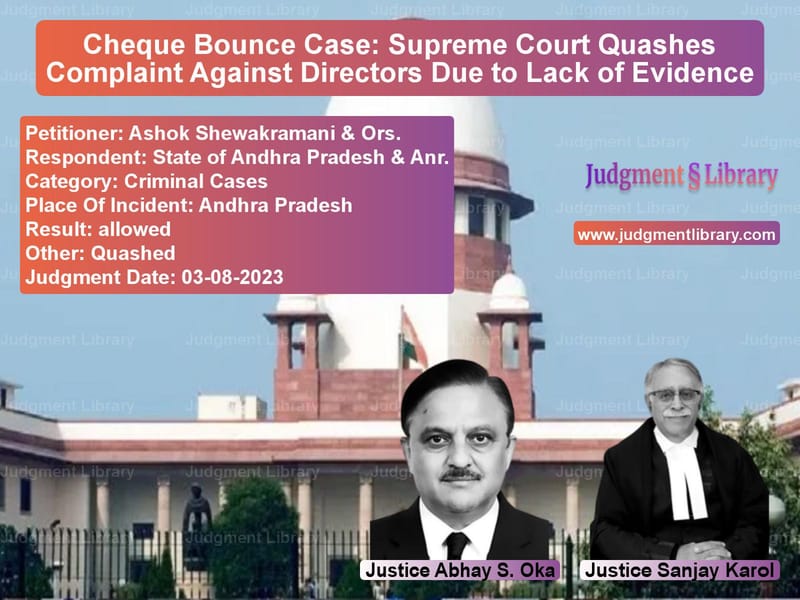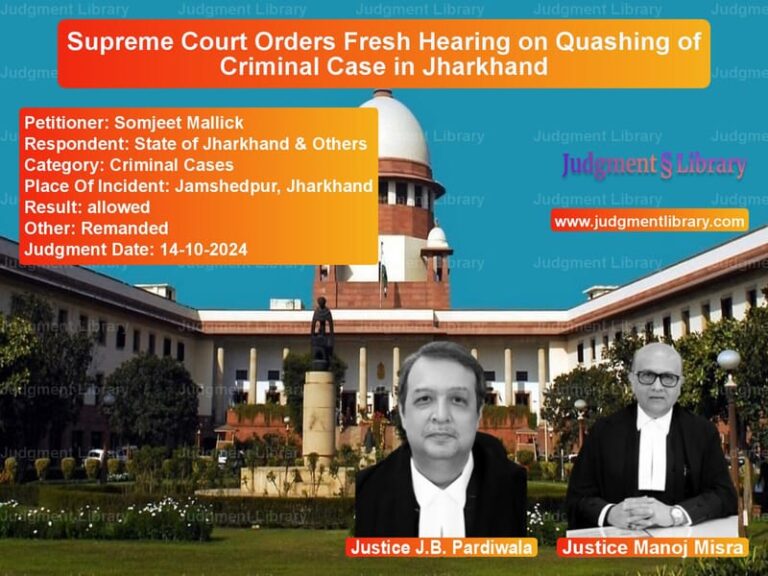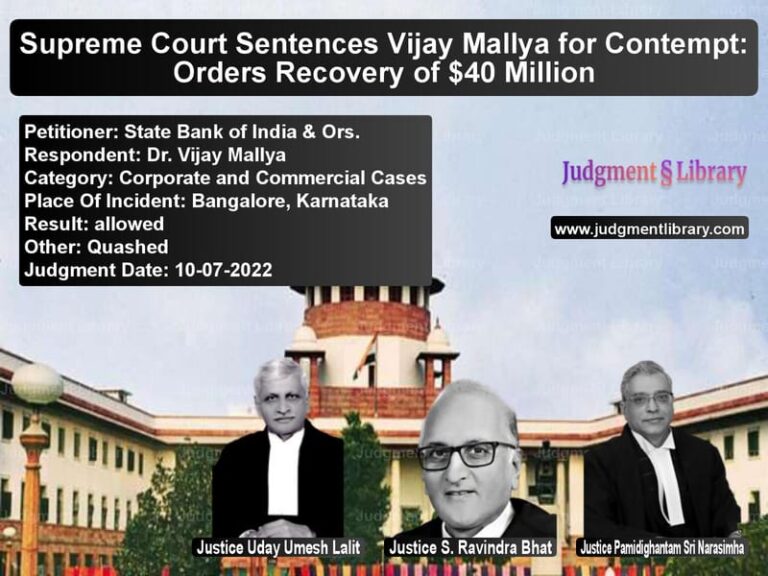Cheque Bounce Case: Supreme Court Quashes Complaint Against Directors Due to Lack of Evidence
The Supreme Court of India recently ruled on a significant case concerning cheque dishonor under Section 138 of the Negotiable Instruments Act, 1881 (NI Act). The case, Ashok Shewakramani & Ors. v. State of Andhra Pradesh & Anr., addressed whether company directors can be held liable for dishonored cheques issued by the company without specific allegations against them.
Background of the Case
The appellants, Ashok Shewakramani and others, were directors of a company accused of issuing dishonored cheques. The complainant filed multiple complaints under Section 138 of the NI Act, claiming that all directors were responsible for the company’s financial transactions.
The directors sought to quash the complaints by filing a petition under Section 482 of the Code of Criminal Procedure (CrPC), arguing that they were not signatories to the cheques and had no direct involvement in the alleged transaction. The High Court dismissed their petition, prompting an appeal to the Supreme Court.
Legal Issues Considered
The Supreme Court examined the following key issues:
- Whether the complainant made specific allegations against the directors regarding their role in issuing the cheques.
- Whether the directors were “in charge of and responsible for the conduct of the business” as required under Section 141 of the NI Act.
- Whether a complaint under Section 138 of the NI Act is maintainable if the statutory demand notice was not served.
Arguments by the Appellants
The directors contended that:
- They were not signatories to the dishonored cheques.
- The complainant failed to allege that they were “in charge of” or “responsible for” the company’s business activities.
- They were merely directors and not actively involved in financial transactions.
- The statutory demand notice under Section 138 was not served upon them, which is a mandatory requirement for prosecution.
Arguments by the Respondents
The complainant argued that:
- The directors were aware of the cheques being issued.
- They had joint responsibility for managing the company’s financial affairs.
- Failure to reply to the statutory notice should be considered an admission of liability.
Supreme Court’s Analysis
1. Absence of Specific Allegations Against Directors
The Court emphasized that liability under Section 141 of the NI Act applies only to those directors who were “in charge of” and “responsible for” the conduct of business at the time of the offence. It ruled:
“The most important averment which is required by sub-section (1) of Section 141 of the NI Act is that the directors were in charge of, and were responsible for the conduct of the company. The appellants are neither the signatories to the cheques nor are whole-time directors.”
2. Importance of Serving the Statutory Notice
The Court found that the statutory demand notice under Section 138 was not properly served on the accused, which is a prerequisite for prosecution under the NI Act. The judgment stated:
“Service of notice of demand is a condition precedent for filing a complaint in view of clause (c) of Section 138 of the NI Act. This is one ground on which the complaint must fail.”
3. Mere Holding of a Director Position Does Not Establish Liability
The Court held that being a director does not automatically make a person liable for a cheque bounce case. It stated:
“Merely because somebody is managing the affairs of the company, per se, he does not become in charge of the conduct of the business of the company or the person responsible for the company for the conduct of the business.”
Supreme Court’s Decision
Based on the lack of specific allegations and failure to serve the statutory notice, the Supreme Court ruled in favor of the directors and quashed the complaints against them. The Court concluded:
“The appeals are allowed. The impugned judgment is set aside insofar as the appellants are concerned. Complaint Nos. 25, 169, and 74 of 2011 stand quashed only insofar as accused Nos. 5 to 7 are concerned.”
Conclusion
This judgment reaffirms that liability for cheque bounce cases cannot be imposed on company directors without specific allegations demonstrating their direct involvement in financial decisions. The ruling ensures that directors cannot be held vicariously liable unless they had a role in the issuance of the dishonored cheques and were properly served with the statutory notice.
The verdict sets an important precedent in corporate criminal liability, ensuring that only those who actively participate in financial transactions can be held accountable under the NI Act.
Petitioner Name: Ashok Shewakramani & Ors..Respondent Name: State of Andhra Pradesh & Anr..Judgment By: Justice Abhay S. Oka, Justice Sanjay Karol.Place Of Incident: Andhra Pradesh.Judgment Date: 03-08-2023.
Don’t miss out on the full details! Download the complete judgment in PDF format below and gain valuable insights instantly!
Download Judgment: ashok-shewakramani-&-vs-state-of-andhra-prad-supreme-court-of-india-judgment-dated-03-08-2023.pdf
Directly Download Judgment: Directly download this Judgment
See all petitions in Cheque Dishonour Cases
See all petitions in Judgment by Abhay S. Oka
See all petitions in Judgment by Sanjay Karol
See all petitions in allowed
See all petitions in Quashed
See all petitions in supreme court of India judgments August 2023
See all petitions in 2023 judgments
See all posts in Criminal Cases Category
See all allowed petitions in Criminal Cases Category
See all Dismissed petitions in Criminal Cases Category
See all partially allowed petitions in Criminal Cases Category







